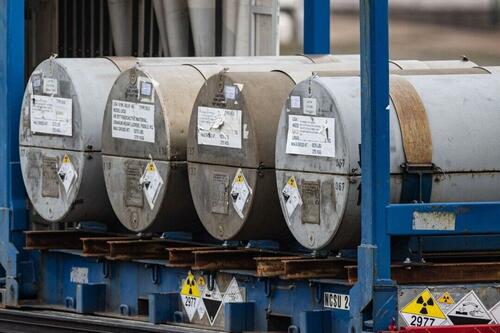Bayer Takes Fight to Avoid Glyphosate Litigation to the Supreme Court

Source: Children’s Health Defense
By Dave Dickey
Up to now, there has been one colossal failure after another in Bayer AG’s efforts to end all lawsuits claiming glyphosate, the active ingredient in the company’s weedkiller Roundup, can cause cancer, primarily non-Hodgkin lymphoma.
Plaintiffs in state courts all across America cite a 2015 International Agency for Research on Cancer study that found glyphosate was “probably carcinogenic to humans.”
Bayer vehemently disagrees. And in 2019, the U.S. Environmental Protection Agency (EPA) issued a ruling that said the study was “a false claim that does not meet the labeling requirements of the Federal Insecticide, Fungicide, and Rodenticide Act [FIFRA],” and that it “will no longer approve product labels claiming glyphosate is known to cause cancer.”
That hasn’t stopped Roundup lawsuits. No siree.
That’s because FIFRA prohibits the sale of any pesticide that is “misbranded.” Under FIFRA, misbranded warning labels fail to contain a warning or caution statement that may be necessary to protect health and the environment.
Plaintiffs argue in state courts that Bayer and the EPA’s failure to warn about the potential cancer risks on Roundup labels amounts to FIFRA-defined misbranding.
And up until recently, the courts have agreed with that assessment.
- In 2021, the 9th Circuit Court of Appeals in Hardeman v. Monsanto found the glyphosate label misbranded.
- Bayer had no luck pressing its case last year before the 11th Circuit Court of Appeals either. In John Carson v. Monsanto, the court ruled for the plaintiff, concluding “that FIFRA does not expressly preempt Carson’s failure-to-warn claim.”
But in August 2024, Bayer struck paydirt at the 3rd Circuit Court of Appeals. The court disagreed with the earlier 9th and 11th Circuit Court of Appeals rulings. In Schaffner v. Monsanto Corporation, the appellate court found:
“Because regulations promulgated to implement FIFRA require the health warnings on a pesticide’s label to conform to the proposed label approved by the EPA during the registration process (the ‘Pre Approved Label’), and because during Roundup’s registration process the EPA approved proposed labels omitting a cancer warning following an extensive review of scientific evidence concerning Roundup’s possible carcinogenicity, we conclude that the alleged state-law duty to include the Cancer Warning on Roundup’s label (the ‘Pa. Duty to Warn’) imposes requirements that are different from those imposed under FIFRA, and that it is therefore preempted by FIFRA.”
Then, in February, another case went against Bayer. In John L. Durnell v. Monsanto Company, the Missouri Court of Appeals upheld a $1.25 million jury verdict to a plaintiff arguing that Roundup caused his non-Hodgkin lymphoma.
Given opposing opinions at the appellate court, last month Bayer filed a petition for a writ of certiorari in the Supreme Court to rule on whether FIFRA preempts state failure-to-warn claims targeting the Missouri Court of Appeals verdict:
“The Court should resolve this split now. The legal issues have been exhaustively ventilated and explored from every angle in lengthy opinions from multiple federal and state appellate courts. There is no material chance the split will resolve itself, as the Third and Eleventh Circuits have each denied en banc review.
“And as this case exemplifies, the consequences are enormous. More than 100,000 cases have been filed seeking to hold Monsanto liable based on a supposed link to cancer that the EPA has exhaustively studied and rejected as unfounded.”
Bayer has paid out approximately $11 billion to settle glyphosate lawsuits. Bayer estimates there are still 67,000 active lawsuits. Obviously, much hinges on whether the Supreme Court grants cert. Certainly, frustration is mounting among the Bayer brass.
The Wall Street Journal reports Bayer may stop producing Roundup unless it gets court protection.
Bayer chief executive officer Bill Anderson’s patience is wearing thin: “We’re pretty much reaching the end of the road. We’re talking months, not years.”
In March, Bayer announced plans to internally separate the glyphosate business from the rest of its crop protection division. Should the courts fail to intervene on Bayer’s behalf, that might be a first step toward Bayer attempting to sell off its glyphosate business.
Rodrigo Santos, head of Bayer’s crop science division, didn’t flat out deny the possibility of a sale: “We’re going to continue to discuss in the future, evaluating all the alternatives that we have for the business. That’s always what we do.”
I think the writing is on the wall. Bayer earned $2.8 billion last year from glyphosate sales. Anderson says Bayer is barely breaking even on sales, and litigation is costing the company up to $3 billion a year.
That’s not sustainable, even for pharmaceutical giants. Something’s got to give.
Originally published by Investigate Midwest.
Dave Dickey is a journalist at Investigate Midwest.















